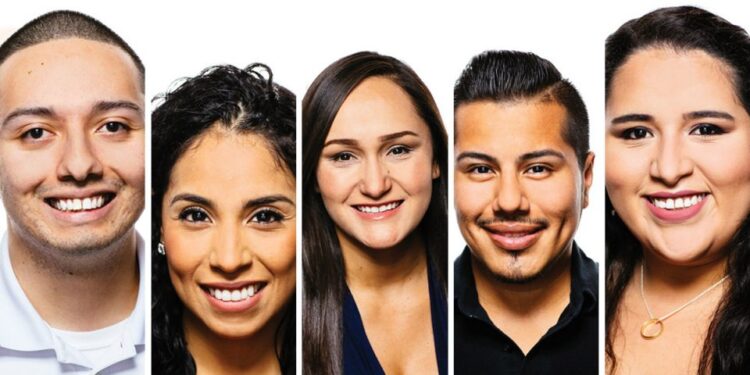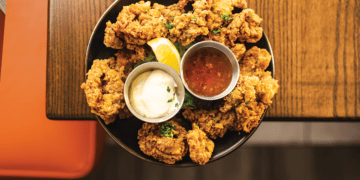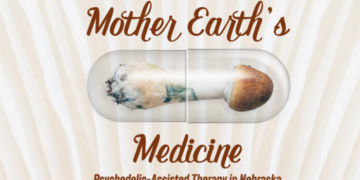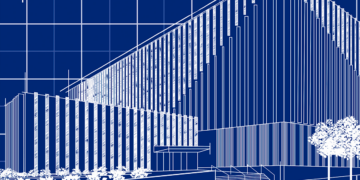In the aftermath of President Donald Trump’s Sept. 5 announcement to terminate Deferred Action for Childhood Arrivals, local Omaha DACA recipients, former DACA recipients, and applicants to DACA shared their stories with Omaha Magazine.
r
https://www.youtube.com/watch?v=ut_uVG6LGn4r
Luisa Trujillo Estrada, 28
r
My name is Luisa Trujillo Estrada. I was born in Mexico—Michoacan. I came to the U.S. when I was 10 years old, so I’ve been here—it is going to be 18 years in February. I’ve been here for a long time.
What is your immigration status?
r
Right now, currently, I am a DACA recipient. I actually am engaged, my fiancé, he is a wonderful man. He is born and raised in the U.S. so he is a citizen. When the decision about DACA came, when it was announced about two weeks ago, we didn’t really know what to expect because we had a certain plan. We got engaged back in February, so our plans kind of changed whether to get married now, should we wait until May how we had planned? I just renewed my DACA, so we are going to continue with that right now. So, currently, I am a DACA recipient.
What does DACA mean to you?
r
DACA, to me, means opportunities. It means being able to run out of the shadows and just trying to have a better life for yourself and for your family. It means the American Dream, like what everyone that comes to the U.S. wants, the “American Dream.” Just having a better life, having better opportunities, whether it is education, job, living. Many other countries are very poor, the conditions, or whether it’s the politics or whatnot, so many reasons why people come to the U.S. So, just having those opportunities, better opportunities than we probably didn’t have before. And just making sure that we leave a legacy for our children of a better life and better opportunities.
What does it mean to be a Dreamer in Omaha?
r
It goes along with wanting a better life for yourself. I guess I could speak for myself, to me being a Dreamer means wanting a better life for myself, for my mom, showing her that everything she did to bring us here to the U.S. was worth it. I actually didn’t want to come to the U.S. I actually had made a deal with my mom and said, well, we’re only going to go there for six months, because I didn’t want to come. I was so little I really didn’t understand the situation, or why she was making that decision. So, she agreed to six months, and now it’s going to be 18 years. Now that I am older and I understand all the struggles, everything that she went through, it means showing her that everything that she went through, it was worth it because now I can say I have a good job, I went to school, high school and college, and I am always looking for better opportunities for myself, but also for her.
How is Omaha part of your identity?
r
It is basically everything that I am. A lot of people from my country, a lot of my family, when they ask me how long have you been in the U.S.? I tell them it’s going to be 18 years, that is more than half of my life. It is double more than half of my life. That is basically everything that I am, everything that I have learned through elementary school, middle school, high school, college, and in the workforce, now working in human resources. Everything that I am as a person is Omaha. From the environment, to my friends, family-wise it is only my mom, my sister, my niece, and two uncles, and that’s it. I really don’t have any more family. A lot of people have big families, but I don’t, so to me Omaha is the place where I was raised. I wasn’t born here, but I was raised here and it is me, basically, it is where I belong.
With the termination of DACA, what are your concerns about the future?
r
Some of my fears, now with the new decision in regards to DACA, are…Thankfully, thank God I have a way to citizenship, to residency. Anything could happen. Life is not predicted, but as of now that is the plan, but I do have a lot of friends and family that are DACA recipients, like my sister and my niece. What is going to happen to them? We talked to my sister in regards to this, and she jokingly said, “Well, you can go back and visit me to Mexico” and I’m like don’t say that, that breaks my heart just thinking them having to go back because she was little, too. She was 12 years old, so she doesn’t know what life is back in our country. Not that we don’t like that life, not that we wouldn’t want to go back, it is just that we are accustomed to this life here in the U.S. and the big fear of going back to the shadows, and not being able to show your full potential and everything good we can bring as citizens to not just our community or Latino community, but to everyone in Omaha, in the U.S. in general, just showing everyone what we can bring. So we are kind of like on hold, and right now we’re in like limbo, because we do not know what is going to happen.
Would you like to share any additional insights?
r
I just really hope, and I do pray every night that there is a change, there has got to be a change. We have shown that we deserve this. We are not criminals, we are not here to do anything wrong, because of the requirements of that. You are supposed to have a clean record, if you do anything bad it is taken away from you. So we have shown that we are good citizens and that we deserve to stay here. That was the way that we had to prove that we can do it, that we can be what the government wants, that we can be those good citizens. I personally love animals, and I am an advocate of animals, and I love saving lives. I like to donate blood. I like to do everything that a good citizen should do for its own community, for its own country. So I just really, really pray that something is done, and we’re just hoping for the best.
https://www.youtube.com/watch?v=dP4YD4nOY1Qr
David Isla Ramirez, 30
r
I was born in Morelos, Mexico. I am 30 years old, and right now I am doing health care processing for a living.
What does DACA mean to you?
r
DACA means hope. DACA means the chance to do what we came here for. I didn’t really have a chance, I didn’t really have the opportunity to choose either stay in Mexico or come to the U.S. My mom and dad got divorced, and the only choice was either my mom or dad. When my mom got divorced, she didn’t really have much, so she had the chance to come here, and my only decision was either stay with my dad or go with my mom. Really, with my dad, I didn’t have a really good relationship. He was working most of the time, so I didn’t really know much about my dad, so, of course, I had to choose my mom. DACA was a chance to become something that my mom was expecting for us, the future she was expecting for us. So it was a pick of hope for us to do something here in the U.S.
What does it mean to be a Dreamer in Omaha?
r
Being a Dreamer, for me, means [being] able to do, or able to move up in life. When I came to the U.S. I was able to go to high school. I had the chance to go to college, and after college, it was pretty much the end for me. After graduating from college and getting a bachelor’s degree in psychology, major, communications minor, I wasn’t able to move up because I had to be a legal resident in order for me to get any type of help; to either get a master’s or get a job, like the job I was going for. So, being a Dreamer means [being] able to move up to where I wanted to be. I had the chance to go from working in a restaurant to go and work on a desk. I was able to have a decent schedule now. I want to at least practice some of the things I went for and actually had to pay my college to get through it, so that’s what it means: it means able to move up, able to accomplish something, which I think that’s what we all came for.
How is Omaha part of your identity?
r
I will have to say Omaha is my home. I’ve been here for a while—16 years—went to high school and college, and I don’t really know any other place that I can say, “I know this place. This is my home.” I know where everything’s at. If I have a problem, I know where to go to. If something’s going on, I know the number to call. I know where to go, the people that can help me. That’s what you call home. Something like that. So, that’s what it means. It means Omaha is my home.
With the termination of DACA, what are your concerns about the future?
r
More than anything, I will have to say fear. I’m afraid of what’s gonna happen, you know, what’s next for us. Like I said before, this is my home. Right now, as many people know, there was an earthquake in Mexico. That’s where my dad’s house was—if there’s any left of what it was. My hometown, my childhood, that’s basically gone. The whole place is basically destroyed by the earthquake. Watching those videos, watching the news, made me think about what’s going to happen to me. Where am I going to end up going? If DACA ends I’m not really sure what’s going to be next for me, where, you know, everything I worked for, all the effort I put into—it’s pretty much done. That’s my only concern—what’s going to happen to us. I’m not the only one who worked really hard—I know other people can relate to my story and they say, “Yeah, we did work hard for this, and it’s pretty much gone.” And going back to a place where I haven’t been there since 16 years, watching the videos where there’s pretty much nothing left, if there’s something left out of the house, it’s not really something I can live in. Going back to my dad since after a long time, I talked to him on the phone which is not the same. He still sees me as a little kid. That’s how he left me; that’s the image that he’d get from me. So, that’s my fear.
Would you like to share any additional insights?
r
Like everybody else, I just really hope someone listens—our stories, and has a little bit of compassion to us, and at least help us. You know, if not something better, at least stay where we are. We’ve been good people, and we just need a chance.
https://www.youtube.com/watch?v=NVCxKB5NCKAr
Yanira Garcia, 28
r
I was born in Michoacán, Mexico, and I am a former DACA. As of March of this year, I became a legal permanent resident.
What does DACA mean to you?
r
DACA, to me, meant an opportunity to become a full human being in the American society or in the United States, here in Omaha, because before that I was just a person hiding in the shadows. Through DACA, I was able to do simple things like get a driver’s license and drive. Obviously once that was also available to our legislature, and then I’m also able—I was also able to work, I was also able to travel, simple things like that. But more importantly, I think I was able to feel a hundred percent part of this community, of this society, without having to be ashamed of not having the proper documentation or an ID. When you go to a bank or when you go to some important high-security place where you need to have documentation, there was a lot of things like that that I couldn’t do before that I was able to do once I got DACA.
What does it mean to be a Dreamer in Omaha?
r
It means being able to, again, be part of this thriving force. As I understand right now, there’s about 3000 of us here in Omaha and I keep saying us, because once a Dreamer, always a Dreamer, and I lived that experience, so I can still identify to DACA or Dreamers, even though I’m technically not one anymore. So it just means being able to be part of the community, it means being able to continue to dream, to continue to fulfil a goal, a dream, which is to get a higher education. That’s how it started, and then to go on to become professional something, right, to be a professional someone, and then to be able to live out that dream fearless and unashamed.
How is Omaha part of your identity?
r
Omaha has been my home for the past 20 years. I don’t know any other place other than Omaha; I mean, I was raised for the first eight to nine years of my life in Mexico, but that’s so long ago that it’s been longer the time that I’ve lived here in Omaha. To me, Omaha is my home and it’s part of who I am, everywhere I go. Omaha is what I refer to as home, and where all my childhood experiences and a dozen experiences and now young adult experiences are happening.
With the termination of DACA, what are your concerns about the future?
r
As a former DACA, personally it doesn’t really affect me because now I’m a legal permanent resident, but I still feel and I still hurt for all of my friends, all of my siblings, and family members. We all have cousins, or we all know somebody very closely that is still DACAmented. I’m still fighting the battle with them, I’m still standing with them, and it still breaks my heart. It still hurts to see our government hurt such a powerful and talented group of people, that all they want to do is live in this country like everybody else and fulfill a dream and contribute and give back financially, through volunteer work, through skills, through just…everything that we’ve learned, and so, it’s dis-encouraging, but at the same time, it kind of reminds me that we started this battle long ago, and if we need to keep fighting, we’re gonna have to do that.
Would you like to share any additional insights?
r
I’d just like to share with whoever is watching this video that I want them to know and support Dreamers, to if they have any questions, to reach out to all the local nonprofits and all the local groups that are advocating for the dream to continue, or for DACA to continue, and even the better dream now would be for DACA to stop being an executive action or an executive order and become a law, something that can be permanent, so that people can stop fearing, so that this uncertainty can just stop, and for all these 800,000 DACAmented people in the nation right now can just step completely out of the shadows and live a completely fearless life and integrate a hundred percent into their American dream.
https://www.youtube.com/watch?v=yyO6ICKiwGYr
Armando Becerril, 24
r
I was originally born in Mexico City, and I am currently a DACA recipient.
What does DACA mean to you?
r
DACA seriously means everything. It’s provided me the opportunity to go to college, start my career with an accounting firm, and just develop as an American more than anything. At the end of the day, we’re not U.S. citizens on paper, but we’ve lived in American communities our entire lives, so it has really allowed me to step out of the shadows and contribute as a full American, as we consider to be a citizen.
What does it mean to be a Dreamer in Omaha?
r
It means that I’ve been given a different status, legal status, by immigration, but I feel like it hasn’t really hindered me. Yeah, there are some areas where we don’t have full rights, like we can’t leave the country and a few other situations that are similar to that, but other than that, we’re just Omaha folks, just living day to day, going to school, going to work, buying groceries, going to baseball games, College World Series, Creighton basketball games. So, you know, they tried to put this label on us, but at the end of the day, I just feel like we’re just like me and you, we’re doing the same things on a day-to-day basis, so, even though it has provided that different status for us, it is a blessing, I still feel like I’m an integral and I’ve integrated into the Omaha community.
How is Omaha part of your identity?
r
Well, Omaha’s part of my identity because it’s where I started my career. Just, almost a year ago, and so it’s shaped me, and it’s helped me develop as a professional and as an overall better human being, because that’s added that responsibility of what I have to deliver to the client, to myself, to my firm. So just in that aspect it’s made me also grow, not just professionally, but personally because I’ve had it be on my own in a city a hundred miles away from where my mom’s at, so it’s really helped me develop, and will continue to help me develop in a positive direction.
With the termination of DACA, what are your concerns about the future?
r
My main concern is that there’s so much uncertainty. There’s a lot of rhetoric going around of which way DACA will go, if the DREAM Act will be passed, if some variation of the DREAM Act will be passed, if it will be attached to border security or just some other economic-related budget or bill. So it’s tough to really have an exact feeling, because one day they say, “oh, it’s going in the right direction, we’ve had talks with the GOP and the Trump Administration,” and the next day it’s like “oh, now we’re looking at this, we’re looking to revise the bill,” x y z, and so it’s pretty hard, because like I said, there’s so much uncertainty that we’re trying to figure our lives out day by day while at the same time trying to live with this huge level of uncertainty.
Would you like to share any additional insights?
r
Just for anyone that watches this to understand our situation. It’s a very unique, particular situation, and more than anything—we have a lot of support; for example, I’ve recently read that Tim Cook is saying that DACA is one of the most important issues of our time. And I can attest to that because we contribute economically, socially; any way that you think about it, we’re contributing. Since DACA passed, our wages and salaries have increased from an average of 20,000 to roughly 35,000 or so. And that’s a huge impact, because that’s, for the fiscal conservatives, that adds tax revenue to every state, municipality, and the federal government as well. We’re working hard. We don’t get any federal financial aid from the government. We work through school, and we don’t receive any benefits, like welfare, Medicaid, any of that sort of—because we don’t qualify, so when people maybe think of, “oh, you know they’re here maybe just leeching and taking U.S. citizens’ benefits,” I just want to tell them to please do their research, because it’s nothing like that. We’re just here, working hard, and all we’re asking for is an opportunity to continue to be blessed in the greatest country in the world.
https://www.youtube.com/watch?v=BJYOZeRpHwYr
Daniela Rojas, 24
r
Hi, my name is Daniela Rojas, and I am originally from Colombia. I work as an admissions counselor at the College of St. Mary, and I have been here in Omaha since 2007—so about 10 years.
What is your immigration status?
r
I was very fortunate to meet somebody who, at the time, had the opportunity to become a citizen. So when we met he was a resident. We didn’t know if he was going to be able to become a citizen. And very, very fortunately, he was able to. So, because I became immediate family to him, we were able to apply for me to become a U.S. resident. So, right now I am a resident.
What does DACA mean to you?
r
For me, DACA means having an opportunity to have a voice. A lot of the people who have DACA currently didn’t have a chance to speak up in the past when their parents brought them here when they were very young, and for me DACA is that opportunity for young people to have their voice heard, to have their opinions and their dreams heard, and be able to be successful, and be able to contribute to our community. That’s what DACA means to me.
What does it mean to be a Dreamer in Omaha?
r
Being a Dreamer is wanting more than what you were initially given. Being a Dreamer means to stand up for yourself and know that your voice is going to be heard. Being a Dreamer means having an opportunity and a chance to have a life worth living, just like anybody else. Personally, I think people who are Dreamers deserve a chance more than anyone else. Because, basically, I think people who are Dreamers have a better opportunity and a bigger chance and deserve that opportunity more than others, because their childhood had been basically arranged from the very beginning. Being a Dreamer, for me, is being able to be an asset to our community, to be somebody worth putting trust in, and I think that’s what these Dreamers want. They just want trust. They want to be able to contribute, to work, to be someone in our community.
How is Omaha part of your identity?
r
I often talk to my parents about this. I think I am more American, I am more of an Omahan, now than I have ever been. I grew up here, my beliefs, my character, who I am as a person, my whole teenage years were here. There are a lot of customs in Colombia that I am no longer familiar with. I am an Omahan. I am part of the city, and I want to see it succeed. I think that part of that comes with all the dreams that these people have of contributing to our city, contributing to our surrounding towns, not just Omaha. So, I personally think if I were to go back to Colombia and start my life over there I don’t even know where to begin. I am completely, 100 percent, an Omahan. I have Colombian roots, but what I believe, where I live, and what I do for a living is to better this community here.
With termination of DACA, what are your concerns about the future?
r
I’m actually not a DACA recipient, I was never granted that opportunity. When I applied for DACA, the decision came back saying that I had arrived to the U.S. too late. So, basically there was a cutoff date, I believe it was June of 2007, and I got here in October of 2007. So, I met the criteria, I had a 4.0, I was an excellent student, I volunteered in everything I could do, but because of those few months, I was not able to get DACA. So, for me, hearing that this opportunity is getting taken away to others, I know what that heartbreak feels like. I know what the discouragement feels like. For me, it is a lack of moral responsibility from President Donald Trump. I think his lack of initiative to fix this issue and his lack of commitment to our community is clearer than ever. The lack of commitment he has for our young immigrants is going to have huge repercussions to Omaha, to our whole country. I was never able to get DACA. I was never able to have had that opportunity given to me as a young adult. So, for me, it is that idea of dreams getting crushed, people losing hope, of young people getting discouraged and turning to other things, that hopefully they don’t have to. Something needs to get done.
Would you like to share any additional insights?
r
I hope that our representatives take the time to take a stand. They have a moral obligation to our community, to our young people, and I feel like there is just so much room for the city to improve, there is so much room for us to grow as a whole, as a community, and it is up to them now to make that choice. Whether or not they are standing with immigration reform or not, this is people’s lives, this is people’s future, this is our future as a community, and I personally feel there is so much they can do, but they just need to take a stand and say whether they want to help or whether they want to see this city crumble. This city was built by immigrants. It was built on land that is not anybody’s but Native Americans, so it is only right for them to do what is morally correct.
r
Learn more about what it means to be an undocumented youth growing up in Omaha from the November/December 2017 issue of Omaha Magazine.
- r
- Read “DACA Decoded” for a legal breakdown of the issues facing local undocumented youth: http://omahamagazine.com/articles/daca-decoded/
- Read “Dreamers In the Heartland” for University of Nebraska-Omaha sociologist Thomas Sanchez’s article on local DACA youths: http://omahamagazine.com/articles/dreamers-in-the-heartland/
r
r













